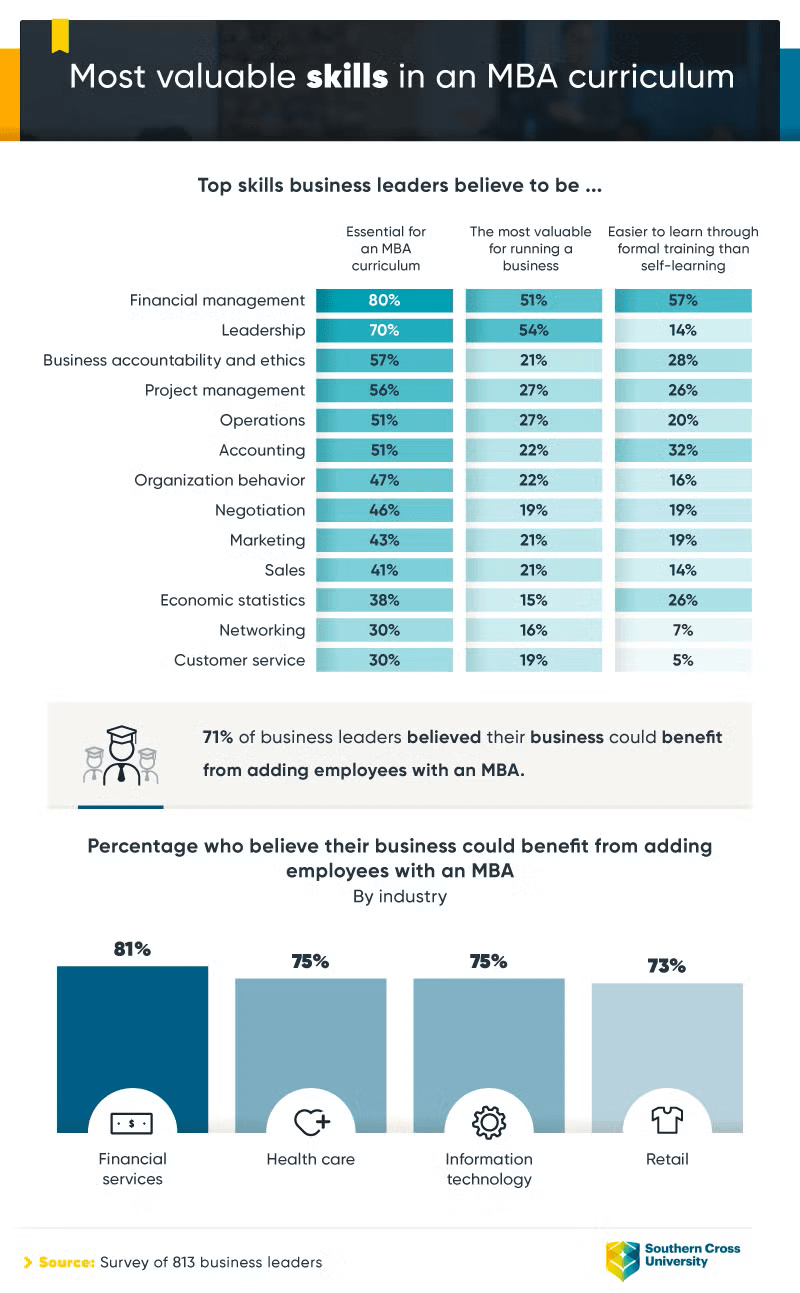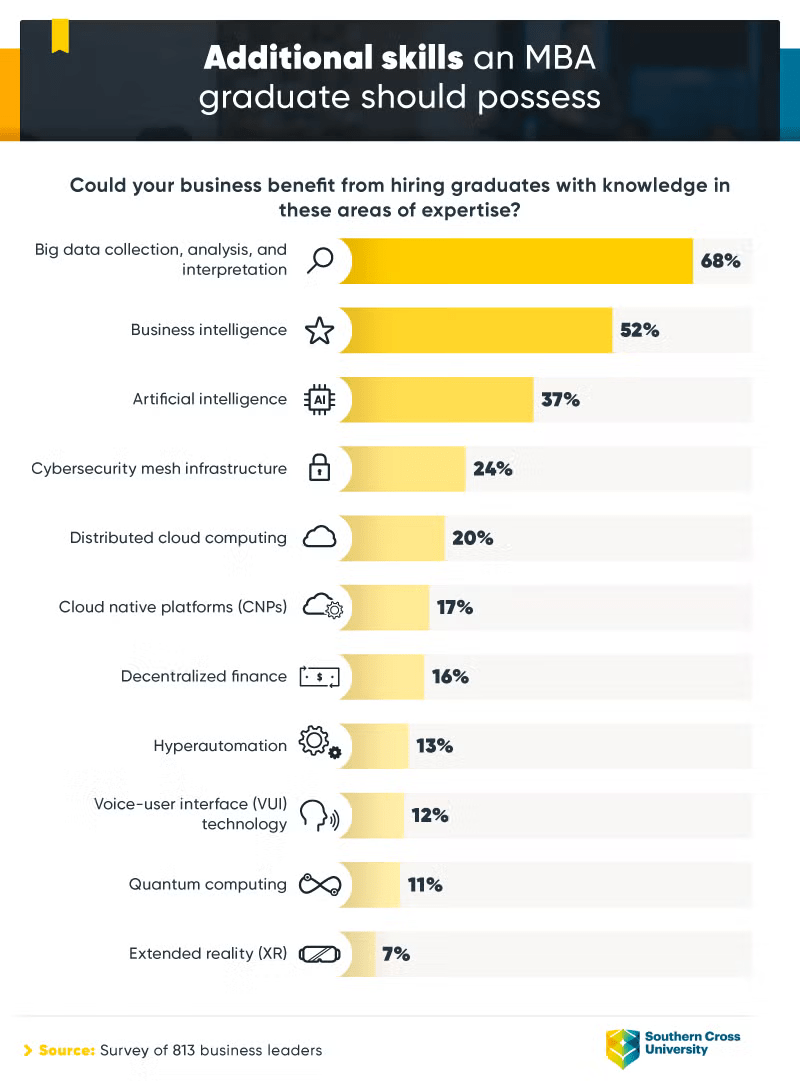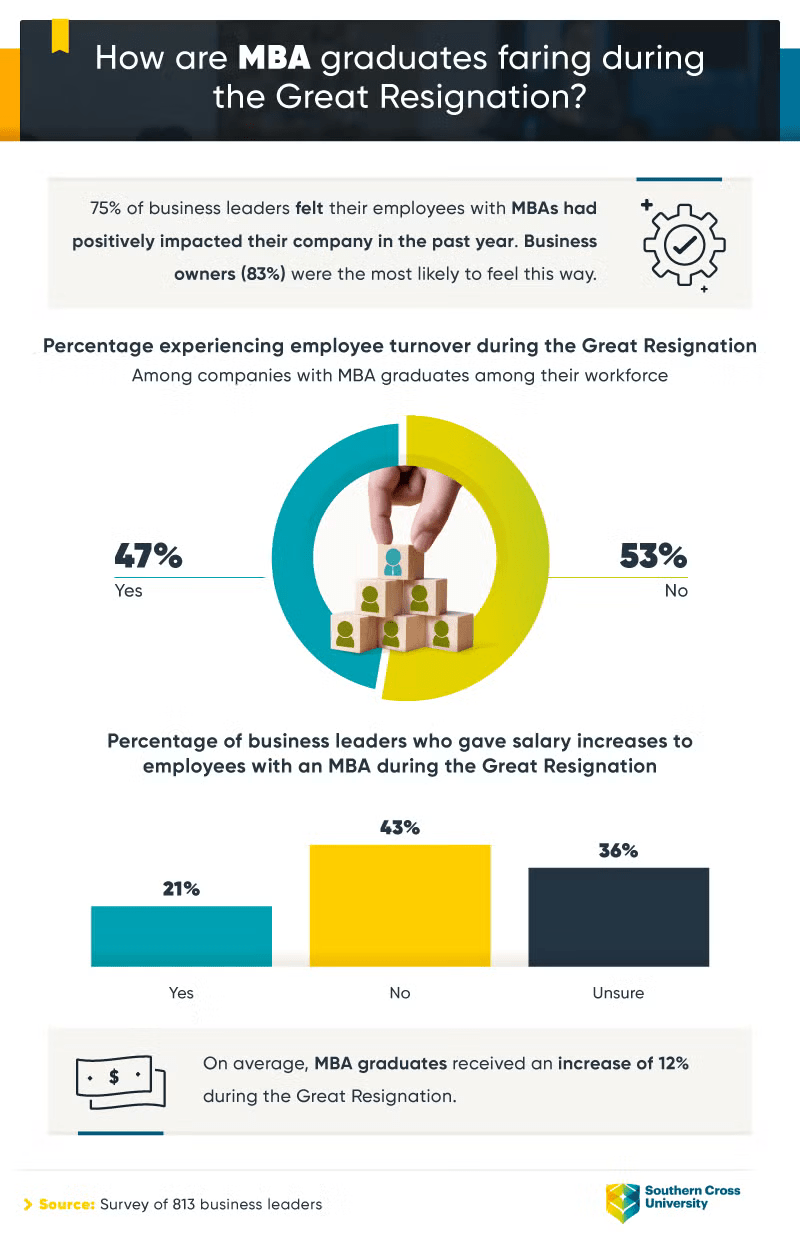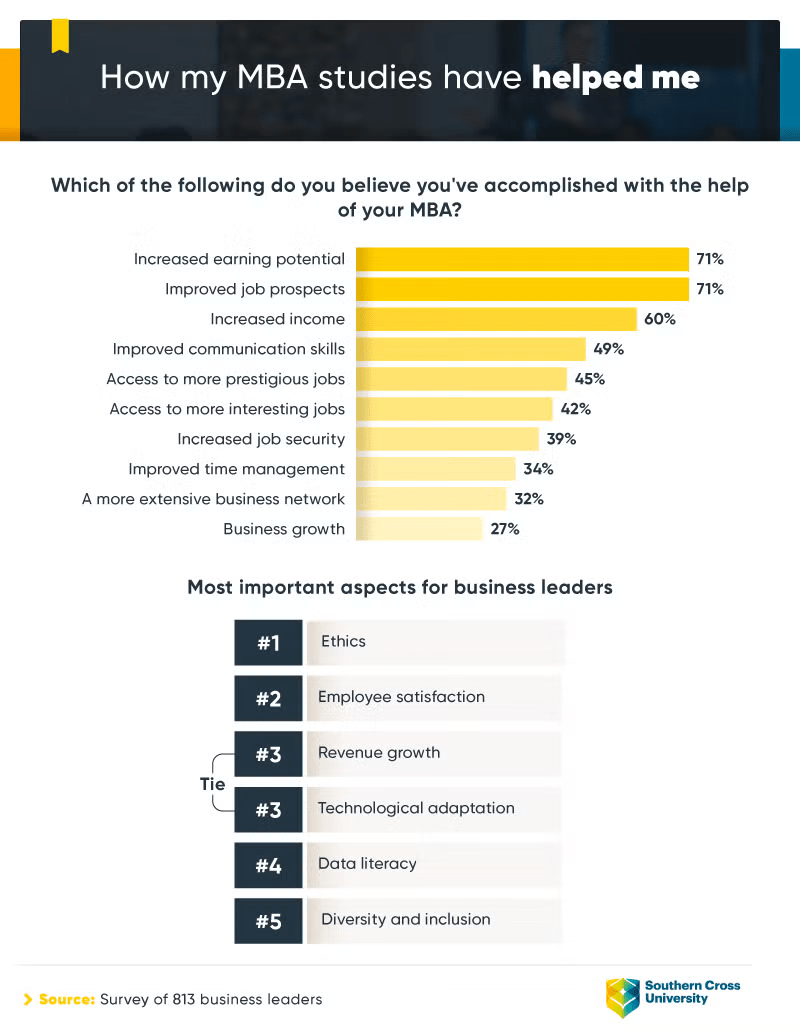Seventy-one per cent of business leaders have found value in employees with MBAs during the Great Resignation.
Key takeaways
- Seventy-five per cent of business leaders felt their employees with MBAs positively impacted their company in the past year.
- Respondents felt financial services, health care, and information technology were the industries where MBAs were most needed.
- According to business leaders, financial management, leadership, and business accountability were the top skills students should learn in an MBA program.
- Respondents also saw the benefit of adding big data collection, analysis, and interpretation skills to their business.
If you’ve ever thought of pursuing higher education, you may have considered enrolling yourself in a Master of Business Administration (MBA) program. Upon completion, you’ll likely find yourself to be a more well-rounded, presentable, and sharp individual who’s ready to take the business world by storm. Personal development aside, you’ll also receive amazing growth and job opportunities, among other benefits. In this article, the various perks that come with mastering this master’s degree will be further outlined.
To learn more about why pursuing an MBA could be a great opportunity, we interviewed 813 business leaders, asking them about this very topic. What kind of skills do they expect MBA graduates to have? Which skills would benefit their company the most? It’s no secret that an MBA will catch the attention of just about anyone looking to add top-tier talent to their team. And even in a time when a record number of people are leaving their jobs in pursuit of something better, masters of business administration continue to thrive in the positions they worked so hard to get. Read on to find out more!
Jack of all trades, master of many?
Getting your MBA should, in fact, make you a master of business administration. That being said, there are other key skills that business leaders look for in MBA graduates when considering taking them on as employees.

Financial management was deemed to be the single most important skill for MBA curriculums to include. Also, while some people prefer to learn independently, most of the surveyed business leaders believed that learning how to manage money and assets in a formal education setting was the more appropriate choice. The majority of business leaders also thought that leadership, business accountability and ethics, project management, operations, and accounting were especially useful skills to touch on throughout an MBA program. To actually run a business, though, the ability to lead was deemed the most useful skill to master.
Business leaders are also always on the lookout for MBA graduates, with nearly 75% of them saying that their business would benefit from hiring an employee with this qualification. The surveyed leaders who work in the financial services industry were especially keen on hiring MBA graduates (81%). Aside from an ability to handle financial assets, leaders also expected said MBA graduates to excel in their planning and organisation skills, to be able to manage time and network well, enjoy problem-solving, and be reliable, among other capabilities.
Above and beyond
Getting your MBA can be tremendously beneficial depending on your desired career path, but as always, the more knowledge you possess the better. With this in mind, we asked business leaders which additional skills or areas of expertise they would like to see on an MBA graduate’s resume.

According to business leaders, if you have the ability to collect, analyse, and interpret big data, you’re likely to be in high demand. Business intelligence experience and knowledge of artificial intelligence could separate you from the rest too. The above list of desirable skills shows that business leaders put an emphasis on proficiencies related to computer science. Cybersecurity mesh infrastructure, distributed cloud computing, and cloud native platforms were a few specialty knowledge areas that were also considered attractive by our respondents.
According to Job Outlook, the future looks bright for management and organisation analysts. They have strong future growth and a current weekly pay of more than $2,000.
Thriving out there
The good news just keeps on rolling in for MBA graduates. During the recent pandemic years, business leaders and owners have benefited from having them on board. Many are content with their jobs and have decided to stick around during one of the biggest job exoduses we’ve ever seen.

More specifically, three-quarters of business leaders felt that their employees with MBA degrees had positively impacted their companies this past year. Also, the aforementioned mass job exodus, commonly known as The Great Resignation, has not hit companies with MBA graduates as hard as those without any. Perhaps this is because MBA graduates have not felt as compelled to leave their jobs, with higher pay and a greater level of appreciation helping to mitigate the challenging conditions of the pandemic workplace.
Even in these tumultuous times, over a fifth of business leaders bumped the salaries of their MBA-holding employees. On average, they enjoyed a 12% increase in their annual income.
Perks aplenty
Getting your MBA not only piques the interest of employers but comes with a whole lot of other advantages, too. Let’s see what some of those are. Also, how do the priorities of business leaders who have an MBA of their own stack up to those without one?

For starters, over 70% of respondents with an MBA believed their degree had helped them to increase their earning potential and improve their job prospects. While these benefits are among those directly associated with an MBA, graduates also noted that their study experience had improved their communication and time management skills. A recent survey highlighted the fact that the median starting salary for new MBA hires was $115,000, much higher than the $95,000 starting salary for direct-from-industry hires and the $65,000 offered to bachelor’s degree hires. MBA graduates’ versatile skill set, including their strategic thinking and communication abilities, explains why their earnings and job prospects are a cut above the rest.
To note, business leaders with their own MBA degree were heavily focused on the finance and operations side of things compared to non-MBA business leaders. For example, the former valued revenue growth, technological adaptation, and data literacy very highly, whereas the latter included ethics, employee satisfaction, and diversity and inclusion in their list of most important considerations.
A world of opportunity
Clearly, pursuing an MBA can be an exceptional route to take for students who are looking to refine their business skills and open up avenues for attractive job opportunities. In order to get noticed by business leaders, though, your degree alone might not necessarily cut it. It’s one thing to be well-versed in financial management, but it’s another to also have niche knowledge of other subjects that businesses are looking to expand on. Having a strong command of different facets of computer science, for example, can separate you from the already impressive pack.
Another interesting and relevant point to make is the fact that MBA graduates are more content with their current positions than the countless Australians who find themselves looking for better jobs in the wake of the pandemic. While many employees are seeking better pay or just need a change of scenery, co-workers with MBAs have been less quick to jump ship. High earnings, attractive job prospects, and a whole lot of personal growth are a few reasons why they might not be looking for a new line of work anytime soon. To learn more about pursuing an MBA, come see if this path may be right for you.
Methodology and limitations
We surveyed 813 business leaders to get their sentiments on MBA programs and what should be included in them. Among these, 50% were men, 49% were women, and 1% identified as nonbinary.
For short, open-ended questions, outliers were removed. To help ensure that all respondents took our survey seriously, they were required to identify and correctly answer an attention-check question.
Survey data have certain limitations related to self-reporting. These limitations include telescoping, exaggeration, and selective memory. We didn’t weight our data or statistically test our hypothesis. The margin of error was +/- 3% with a 95% confidence interval.
Fair use statement
If you’ve ever considered getting your MBA, there’s no time like the present. Otherwise, if you know someone who might be interested in pursuing one, feel free to send this article their way. We just ask that you do so for noncommercial use only and provide a link back to the original page so contributors can earn credit for their work.





